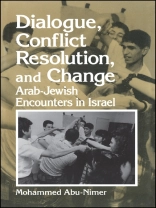Explores Arab-Jewish encounters and relations in Israel from both conflict resolution and educational perspectives.
This is the first study to introduce the subject of Arab-Jewish relations and encounters in Israel from both conflict resolution and educational perspectives. Through a critical examination of Arab and Jewish encounter programs in Israel, the book reviews conflict resolution and intergroup theories and processes which are utilized in dealing with ethnic conflicts and offers a detailed presentation of intervention models applied by various encounter programs to promote dialogue, education for peace, and democracy between Arabs and Jews in Israel.
The author investigates how encounter designs and processes can become part of a control system used by the dominant governmental majority’s institutes to maintain the status quo and reinforce political taboos. Also discussed are the different conflict perceptions held by Arabs and Jews, the relationship between those perceptions, and both sides’ expectations of the encounters. Abu-Nimer explores the impact of the political context (Intifada, Gulf War, and peace process) on the intervention design and process of those encounter groups, and contains a list of recommendations and guidelines to consider when designing and conducting encounters between ethnic groups. He reveals and explains why the Arab and Jewish encounter participants and leaders have different criteria of their encounter’s success and failure. The study is also applicable to dialogue and coexistence programs and conflict resolution initiatives in other ethnically divided societies, such as South Africa, Northern Ireland, Bosnia, and Sri Lanka, where the minority and majority have struggled to find peaceful ways to coexist.
Tabla de materias
List of Figures
List of Tables
Acknowledgments
Introduction
List of Abbreviations
Chapter 1.
Intergroup Relations Approach
Contact Hypothesis Theory
Intervention Models Based on the Contact Hypothesis and Intergroup Relations Theories
Contact Hypothesis Intervention: Shortcomings and Alternatives
Chapter 2.
Conflict Resolution Principles In Intergroup Conflicts: An Alternative Approach To Contact Hypothesis
The Emergence of Conflict Resolution
Conflict Resolution: Definitions and Theory
Basic Assumptions and Principles of Conflict Resolution
Conflict Resolution: Intervention Models and Processes
Select Models of Conflict Resolution
Critique of Conflict Resolution Models
Conflict Resolution Responses to Critiques
Chapter 3.
Arab-Jewish Conflict In Israel: Historical, Social, And Political Background
Context of Arab-Jewish Relations in Israel
Arab-Jewish Relations on the Micro Level: Images and Perceptions
Special Characteristics of the Arab Educational System in Israel
Chapter 4.
The Arab-Jewish Coexistence Programs
Development of the Coexistence Programs
Arab-Jewish Coexistence Programs
Arab-Jewish Coexistence Programs
Research on Arab-Jewish Encounters: Limitations and Needs
Chapter 5.
Methodological Considerations And The Arab-Jewish Programs
The Six Case Study Organizations: Basic Features
Chapter 6.
The Encounter Programs’ Designs: Components Of The Intervention Models
Participants
Assumptions
Goals
Structure
Content
Process
Third-Party Role
Arab-Jewish Encounters: Is There a Generic Model
Chapter 7.
Perceptions Of The Arab-Jewish Conflict In Israel
Intervenors’ Conflict Perceptions
Intervention Models and Perceptions of Arab-Jewish Conflict
Chapter 8.
Perception Of Success And Impacts Of The Encounter Models
What Is Success?
Measures and Criteria of Success
Actual Success
Examples of Success
Participants’ Perceptions of Outputs and Impacts
Perception of Success: The Need for Systematic Measurement
Chapter 9.
Impacts Of The Political Context On The Encounter Models
Major Changes in the Encounter Programs Since the Mid-1980s
Impacts of the Peace Process
Impacts of the Intifada on Intervention Models
Impacts of the Gulf War on the Encounter Programs
Impacts of Soviet Jewish Immigration on Encounter Programs
Encounter Models and Context: Avoidance, Confusion, and Slow Adjustment
Chapter 10.
Arab-Jewish Encounter Programs: Political Change Or Control?
Limitations of the Arab-Jewish Encounter Field
Limitations in the AJP Designs
Do the Examined Intervention Models Contribute to Control or Change Processes
Arab-Jewish Encounter Programs and Educational Conflict Resolution Models
Conflict Resolution Approach in Arab-Jewish Encounter
Major Recommendations
Appendixes
1. Participants and the Intifada’s Impacts
2. Participants and the Gulf War’s Impacts
3. Examples of Success in Arab-Jewish Intervention
Notes
Bibliography
Index
Sobre el autor
Mohammed Abu-Nimer is Assistant Professor at the International Peace and Conflict Resolution Program at the School of International Services at American University.












